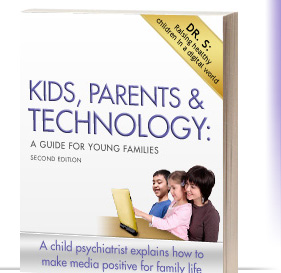Link to Original Article
A Nielsen survey just released shows that 70 percent (and increasing) of 12 year olds and younger kids in tablet-owning households play games, while 57 percent access “educational” apps.
“Many of those called “educational” apps have hardly been shown to have any such value, since there is no credible standard for that claim,” according to a leading Chicago child-psychiatrist Eitan Schwarz, M.D., faculty member at Northwestern University’s Feinberg school of Medicine. “And tablet play is indoors and usually seated, adding to the epidemic of obesity,” he adds.
“Parents need to wake up. Their preschoolers and early graders, especially, are in a special phase of active brain growth. They need to be stretched with challenging interactivity in a scaffold of social experiences,” according to Dr. Schwarz. If tablet play merely requires reacting to the computer’s screen without the challenges of imagination or creativity, whether with drawing, words, reading, or generating ideas, the child loses crucial and irretrievable opportunities to stretch and develop their brains into new ways of thinking, discovering, seeing the world and himself, according to the doctor.
Tablet play is usually solitary — Nielsen reports that 15 percent communicate with friends or family, and 55 percent of parents use tablets to keep kids quiet while in restaurants and travelling. The doctor reacts, “Social interactions within the family are the scaffolding on which human brain development and learning are built. Solitary seated interactions with a tablet essentially can make the child a quiet, docile, overweight robot that gets attached to another robot. If parents really understood that, they would be horrified”
He goes on, “The report that 55 percent of parents actually abandon their kids’ minds in restaurants and while travelling to these machines is astounding. Parents are missing opportunities to get to know their children and teach them how to behave in challenging situations or fill down time productively from the inside of their minds, or with conversation, or reading, or just looking out the window rather than depending on a machine to keep them busy. All this is happening when the child’s brain is actively being rewired with circuits that will last a lifetime,” according to Dr. Schwarz.
“Tablets are handsome, fascinating tools with extraordinary powers to engage and interact, produced by human creativity, focused minds, talent and sweat, enabled by all the opportunities afforded in free societies,” according to Dr. Schwarz, a veteran doctor with over forty years in practice, himself a recent inventor of ZillyDilly, an iPad app. Dr. Schwarz recommends:
• Do not give tablets to preschoolers for solitary play, and discourage excessive solitary play by all kids.
• Make a weekly media plan as you do a nutrition plan.
• Teach lifestyle media habits as you do good hygiene and diet.
• Limit and monitor screen time for all ages.
• Treat the tablet as a family appliance with specific rules and keep it charging in a common area.
• Purchase apps very carefully and understand their value.
• Ask educators for advice about so-called “educational” apps.
• Balance entertainment use with worthwhile growth opportunities like family relationships, socialization, values education and education enrichment.
• Teach kids that having a tablet is a privilege that some kids cannot afford, so they need to be sensitive about showing off their prized possession.
• The tablet and app acquisition wow are addicting highs. Avoid seeking too many such experiences based on the possession of material things.
• Teach children to be curious and generate interests from their own thoughts and seemingly more ordinary, more reflective experiences that nourish the human spirit and are really satisfying and enduring and truly worth building their lives around.
Dr. Schwarz believes that current tablet misuses are a waste of these awesome tools and of human potential, the kind that made possible the creation tools like the iPad, “As a society, we can do much more to align pop-technology to what kids really need. Kids don’t come with instruction manuals, as do these tablets. We need to educate, empower, and enable parents to find better uses for these wonderful tools”



Attention Parents: Be Careful — Tablets Can Make Your Child into an Overweight Robot CHICAGO, IL Friday, February 17, 2012
Link to Original Article
A Nielsen survey just released shows that 70 percent (and increasing) of 12 year olds and younger kids in tablet-owning households play games, while 57 percent access “educational” apps.
“Many of those called “educational” apps have hardly been shown to have any such value, since there is no credible standard for that claim,” according to a leading Chicago child-psychiatrist Eitan Schwarz, M.D., faculty member at Northwestern University’s Feinberg school of Medicine. “And tablet play is indoors and usually seated, adding to the epidemic of obesity,” he adds.
“Parents need to wake up. Their preschoolers and early graders, especially, are in a special phase of active brain growth. They need to be stretched with challenging interactivity in a scaffold of social experiences,” according to Dr. Schwarz. If tablet play merely requires reacting to the computer’s screen without the challenges of imagination or creativity, whether with drawing, words, reading, or generating ideas, the child loses crucial and irretrievable opportunities to stretch and develop their brains into new ways of thinking, discovering, seeing the world and himself, according to the doctor.
Tablet play is usually solitary — Nielsen reports that 15 percent communicate with friends or family, and 55 percent of parents use tablets to keep kids quiet while in restaurants and travelling. The doctor reacts, “Social interactions within the family are the scaffolding on which human brain development and learning are built. Solitary seated interactions with a tablet essentially can make the child a quiet, docile, overweight robot that gets attached to another robot. If parents really understood that, they would be horrified”
He goes on, “The report that 55 percent of parents actually abandon their kids’ minds in restaurants and while travelling to these machines is astounding. Parents are missing opportunities to get to know their children and teach them how to behave in challenging situations or fill down time productively from the inside of their minds, or with conversation, or reading, or just looking out the window rather than depending on a machine to keep them busy. All this is happening when the child’s brain is actively being rewired with circuits that will last a lifetime,” according to Dr. Schwarz.
“Tablets are handsome, fascinating tools with extraordinary powers to engage and interact, produced by human creativity, focused minds, talent and sweat, enabled by all the opportunities afforded in free societies,” according to Dr. Schwarz, a veteran doctor with over forty years in practice, himself a recent inventor of ZillyDilly, an iPad app. Dr. Schwarz recommends:
• Do not give tablets to preschoolers for solitary play, and discourage excessive solitary play by all kids.
• Make a weekly media plan as you do a nutrition plan.
• Teach lifestyle media habits as you do good hygiene and diet.
• Limit and monitor screen time for all ages.
• Treat the tablet as a family appliance with specific rules and keep it charging in a common area.
• Purchase apps very carefully and understand their value.
• Ask educators for advice about so-called “educational” apps.
• Balance entertainment use with worthwhile growth opportunities like family relationships, socialization, values education and education enrichment.
• Teach kids that having a tablet is a privilege that some kids cannot afford, so they need to be sensitive about showing off their prized possession.
• The tablet and app acquisition wow are addicting highs. Avoid seeking too many such experiences based on the possession of material things.
• Teach children to be curious and generate interests from their own thoughts and seemingly more ordinary, more reflective experiences that nourish the human spirit and are really satisfying and enduring and truly worth building their lives around.
Dr. Schwarz believes that current tablet misuses are a waste of these awesome tools and of human potential, the kind that made possible the creation tools like the iPad, “As a society, we can do much more to align pop-technology to what kids really need. Kids don’t come with instruction manuals, as do these tablets. We need to educate, empower, and enable parents to find better uses for these wonderful tools”